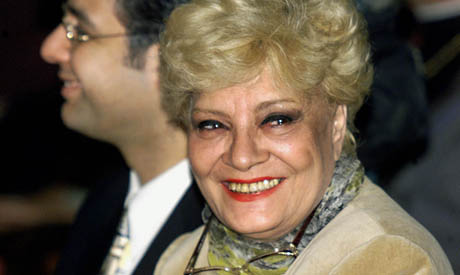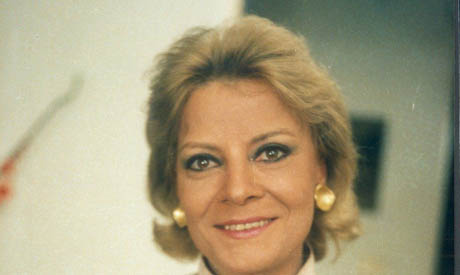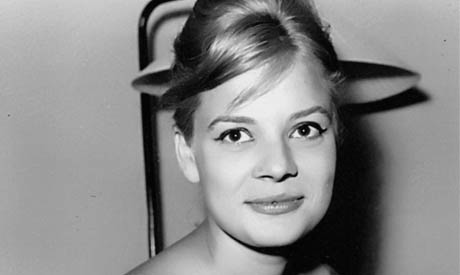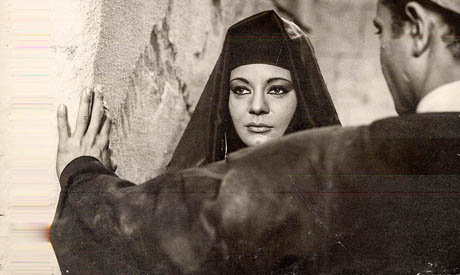The legendary film star Nadia Lutfi passed away last Tuesday at the age of 83. Born in Cairo in 1937, Lutfi would become a pillar of the Golden Age of Egyptian cinema, acting opposite the greatest talents of her day and leaving behind a rich and varied legacy. Her work includes La Anam (Sleepless, 1957), Cairo Station (1958) and Sultan in the same year, Al-Mustahil (The Impossible, 1966), Ayyam Al-Hob (Days of Love, 1968), Hobi Al-Wahid (My Only Love, 1960) and many others. In 1994, the late filmmaker Mohamed Shebl profiled Lutfi for Al-Ahram Weekly:

Legend has it that Paula Mohamed Shafiq, better known to us as Nadia Lutfi, is of Polish origin. For years her Swedish-blonde hair and ravishing beauty, not to mention the fact that she was educated at a German school, added to her mystique. As a matter of fact she is a delicate mélange of Alexandria and Upper Egypt. She was born a star and for years almost totally dominated the Egyptian cinema. She married twice and has one son whom she lovingly refers to as «Mishmish». Her granddaughter is a dead ringer for Nadia Lutfi as a child.
Suddenly, in the aftermath of the 1973 war, she disappeared from the silver screen and became a recluse of sorts, embroiled in the human sufferings that are usually left behind after any war. She got locked up in helping, supporting, sheltering and trying to cope with the immense suffering and pain left behind. Nadia Lutfi was then equally involved with the Palestinian freedom fighters and flew to Beirut, camera in hand, to witness the mass exodus of the PLO. For years she was in hospitals, refugee camps or rehabilitation centres.
And for year she was bombarded with the question: «When are you going to return to the silver screen?» «What›s the point of returning to the silver screen, as you put it? I keep being asked why I am not doing more pictures or television. What›s the point? Most of the scripts they send me are either rehashes of stories I have already done, honest carbon copies of Hollywood classics, or just pure trash. The same plots, the same scenarios build-ups, the same co-stars, and the same attitudes. Over and over again. You would think the film people have learnt their lesson. The movie-going public has been sending us clear-cut messages that they are fed-up. Just look at the box-office returns.»
Nadia Lutfi, the angry actress who is considered by many a living legend, puffs aggressively at her umpteenth cigarette. She is not in the mood for mincing words.
«We have a responsibility towards the people. I feel this responsibility eating away at me constantly. I cannot just go on doing pictures that are worthless, or that may convey the wrong messages to people. We owe it to the people, since we take their hard-earned money, to entertain and please them, and also to deliver a feeling of love, of experience. To add something, to inform them. I hasten to add that this is no way indicates lecturing them or making syrupy films that give the audience diabetes. I have made many pictures about loose characters, confused women, and some others of dubious professions, but the final message was always one of study. One must study these characters. All characters in all walks of life. To learn, to gain a deeper insight into the human soul. How it moves, reacts and interacts, and how it creates its own reserve of feelings and emotions, gained over the years through experience are. They form the essence of the human character.»
Nadia Lutfi, as a matter of fact, has portrayed a plethora of characters that would make the greatest of Hollywood stars envious. She was first introduced to the screen in the film Sultan, although her initial start had been planned with Youssef Chahine. Something happened, Chahine left Egypt for a while, and by the time he was back in the studios, Nadia Lutfi had already become a superstar. They collaborated, however in a sleeper titled Hob Ila Al-Abad (Love Forever); both of them would rather not talk about it. She will concede that Chahine, ever the actor’s director, helped her to go deeper into the character and build on her own experience to bring out the best.
“We were shooting a scene in a car where I was supposed to be listening to an inner voice. He was squatting on the floor, explaining that I was supposed to be overwhelmed and crying. The tears wouldn’t come. He was nagging me and I was becoming tense and near hysteria. He eventually got up, whispered the magic words in my ear, and the tears started rolling. He explained that the viewer was not watching Nadia Lutfi the actress, but whoever she was, the heroine of the love story. After all the film was about a never-ending love story. I understood that I was out of character. I closed my eyes and thought of all my loved ones. My marriage, my parents, my own childhood, my personal traumas with love. I never forgot this particular event. Whenever I got stuck with a particularly difficult scene, his voice would come to me.”

“The roles that followed where as diverse and important as they were different. Lutfi starred in the classic Al-Naddara Al-Sauda (Dark Glasses) directed by Hossameddin Mustafa, and La Totfe Al-Shams (Let the Sun Blaze On) directed by Salah Abu Seif. She played Louisa, the beautiful Christian missionary, in Youssef Chahine’s epic film Al-Nasser Salah Al-Din (Saladin). She portrayed Riri, the streetwalker who comes across the famous writer searching for a meaning to life in Naguib Mahfouz’s Al-Semman Wal-Kharif (Quails and Autumn). Again in a Mahfouz classic, she played the role of Zouba in Al-Sukkariya, directed by Hassan El-Imam. She starred in Al-Khaaina (The Adulteress) opposite Mahmoud Morsi and directed by Kamal EI-Sheikh, playing the part of a bored wife who feels her life slipping away with an inattentive yet extremely jealous husband, who believes she has been unfaithful to him. She played the title role of Badia Massabni, the famous singer/dancer of the forties, in the film directed by Hassan El-Imam.
Lutfi also made a cameo appearance in Shadi Abdel-Salam’s renowned and internationally acclaimed Al-Momia: Laylat An Tohsad Al-Senin (The Mummy: The Night of Counting the Years).
In one of her more controversial but most acclaimed films of the sixties, she starred in Hussein Kamal’s directorial debut, Al-Mustahil (The Impossible). She twice acted opposite the legendary singer Abdel-Halim Hafez, first in Al-Khataya (The Sins) directed by Hassan El-Imam, and again in his last picture, Abi Fawq Al-Shagara (My Father Is atop the Tree), the top-grossing film of all time in the Arab world, again directed by Hussein Kamal. In the latter, she portrayed Fardous, the voluptuous belly dancer and queen of the night clubs, who initially seduces the young teenager as simply some new toy with which to pass the time, then, as she falls deeper and deeper in love, embarks on drawing him into the sordid intricacies of cabaret life. Later, as good prevails over evil, she chooses to sacrifice her love so he can return to his family, his peers and his studies.
Do you think I set a bad example for youth by portraying these characters? Quite the contrary. I have met hundreds of mothers who told me that the life of their kids was radically altered after they saw this film. I have received thousands of letters much in the same vein, most of them from young people who admit that this film changed their attitude to life.”

She points to several suitcases bulging with fan mail. The temptation to sift through them is irresistible. One large suitcase overflows with mail sent in from all over the Arab world. The letters, along with thousands of personal photographs, are from ex-soldiers or freedom fighters, most of them permanently disabled during the many wars that have stricken the Middle East. They write in for moral support, sometimes to inquire about this or that hospital or doctor, but mostly it is just to send greetings.
Some write that they have just seen this or that film on television and how they once again enjoyed it and wanted me to know how great it was, etc. You see, this is what I mean. No amount of cash can ever surpass or equal the tremendous emotional push one gets when one realizes that part of the personal energy released has been successfully transferred to other people. I mean, in the end, what will be left on us, as artists? Is it only our artistic achievements – films in someone’s video library? I should hope not. I would rather imagine that what will remain will be the basic human elements that tie us all, as human beings, together.”
But doesn’t Nadia Lutfi want to document all her many artistic and social achievements for future generations – not only her many films, but her many other social and political activities? Her travels to Beirut, her meetings with the Palestinian resistance movement, her discussions with Yasser Arafat. And before that, in the aftermath of the 1973 war, her many visits to the frontline hospitals, her tireless efforts to help the disabled.
“I was asked to do a television documentary. Sort of “My Memoirs”, and I thought to myself what have I done that is worth mentioning? What in my life is worth immortalising for posterity? The answer that kept coming to me was my human experience. Even the films and whatever else it is people deem interesting to know about me, are just phases I have gone through. Only if we look at them from a human angle, do they gain importance.
“It is everyone’s own personal human experience that counts. This can, and should be taped and enjoyed by people, by future generations. Because in the end, I am not just Nadia Lutfi the actress or star or whatever it is you want to call me. I am Paula Mohamed Shafiq, the human being, the Egyptian who has lived a life fill of great moments, been through war and peace, seen happiness and many many tears, and is still fighting on to make this planet a more livable place.”
Even though one could get the impression that Nadia Lutfi treats her cinema portrayal with nonchalance, nothing could be further from the truth. She slaves over a script, trying very hard to extract from the character all its nuances and finer details. She rarely speaks of “films” but rather of “characters”. She will speak of Fardous and Riri or Louisa as people she knew, or was. She has a very sharp definition of these characters; when she is hounded to come out of her self-imposed seclusion and make more films, she usually snaps back: “To do what?”

It sometimes seems like she has done everything, lived all the characters. She doesn’t want to come back as Cleopatra; nor does she want to act in some of the dreary films being churned out these days. But the great thing is that she is not livid about the drivel she sees on the telly or on video. She takes everything in stride with a smile and a laugh.
“I try to see all the films that come out. Some are worth studying, even the bad ones. Some of the films just conk me out, but nevertheless, I sit through to gauge the developments in the film industry.”
Nadia Lutfi has recently finished shooting a comical mini-series for television: Nass Welad Nass (People Who Are People), directed by Adel Sadeq.
Why a light comedy? Has she forsaken her internationally recognised social role? Is this the beginning of a full-fledged comeback?
“Not necessarily. When and if something good comes I’ll do it. And I have not and will never forget my role and duty towards society. Not only because it’s a “duty”, but because this is what I really enjoy in life. I hate depression. I would do anything to see a smile return to a child or wounded soldier or a stricken mother. I will dry tears, go to the front, fly to Lebanon or whatever I am needed, not just to hand out blankets and wave, buy to understand. I do these things not only for them. I do them also for myself, because in sharing their sufferings I try to understand myself, humanity, the whole thing. So if I can bring some smiles to people through comedy, that is what I will do at this moment.”
*A version of this article appears in print in the 6 February, 2020 edition of Al-Ahram Weekly.
Short link: